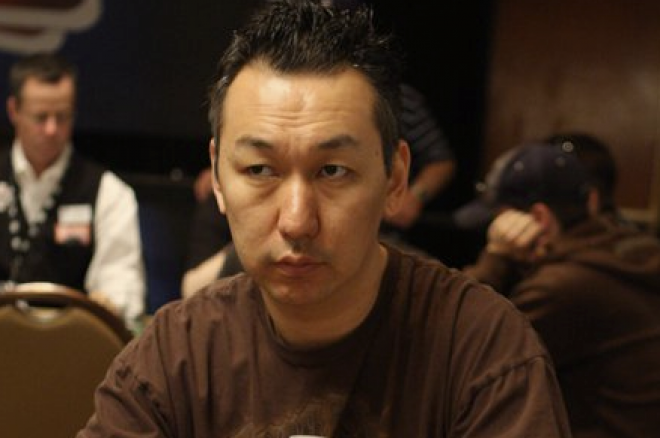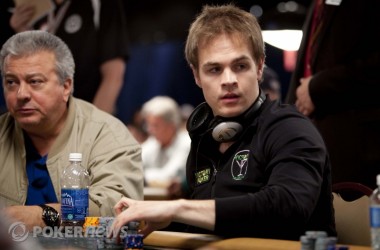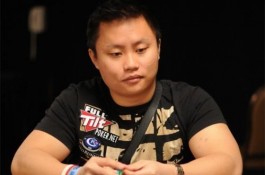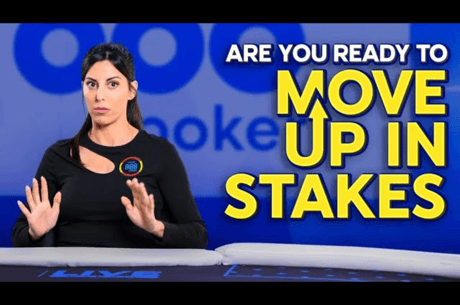John "Nicolak" Kim Analyzes Two Cash Game Hands

John Kim is a professional cash-game player and instructor for CardRunners. He plays mostly online under the screen name "Nicolak" but has been known to play big tournaments, as well. He talked to PokerNews about two hands he played in which understanding polarization helped him make key decisions.
Hand #1
Game: $5/$10 no-limit hold'em six-max
Stacks: Hero - $1,067; Villain - $1,067
Preflop Action: Hero raised under-the-gun plus one with A?J? to $30. Villain reraised to $90 from the cutoff. Hero called. The pot was $195.
Why did you decide to flat ace-jack out of position to a three-bet?
It's pretty close between a fold and a call. Depending on how confident you are in your post-flop skills will allow you to determine whether to flat or fold. Four-betting is a little too light because we're probably behind if he jams and have to fold. Even though it's suited, it's a hand that gets troublesome to play post-flop out of position and without initiative. But, because I felt confident in my game, I called.
Flop Action: The flop comes Q?8?5?. Both players checked.
What was your read when he didn't continuation-bet?
He could have total air and just be giving up because I think in his eyes, my range is ace-queen, ace-jack, and medium pocket pairs that probably won't fold to one continuation bet. He could also have a hand like queen-ten or pocket tens that he is playing pot-control with. So to be honest, I don't know where I'm at, but if he had bet, I probably would have to give it up with nothing more than over with backdoor draws. We can eliminate big hands like sets, ace-queen, and overpairs when he checks back-flop though.
Turn Action: The turn was the 7?. Hero bet $135, and Villain raised to $310. Hero reraised all-in, and Villain called.
Why did you decide to lead the turn?
Well, a couple of reasons. I felt like ace-jack high could be the best hand, and I wanted to seize the initiative, so I wouldn't have to check-call the turn and check-fold the river if I missed. Also, I turned the nut-flush draw with one over and still have the possibility of my hand being best, I felt like leading was best.
Also, I had a plan in place to bet the turn and bet the river even if I missed because, like I said before, I knew he didn't have a big hand unless he turned one, so equity with my nut-flush draw and over, plus my fold equity, plus taking the initiation, plus narrowing my opponent's range to weak to mediocre holdings, equals betting being the best option.
Awesome equation.
Thanks! I guess my calculus teacher would be proud [laughs].
When he raises here, what is his range?
Well, I knew he didn't have overpairs or big queens because he would've bet those on the flop, so at that point, he had to have something like seven-eight, pocket sevens, maybe a hand like pocket tens or jacks that he was trying to set up a cheap showdown with. Or, he could have had draw himself and was trying to take back the initiative so he could shove on the river on a bluff if he missed.
Versus that range, I felt like jamming was best because I wouldn't get bluffed off the best hand. Also, I thought there was a chance that I might get pocket tens or jackets to fold. I was only concerned about pocket sevens and seven-eight, but even versus those hands, we have about nine outs with our flush draw, and versus the combo draws in his range, we are in awesome shape.
Result: The river was the 7?. Villain showed 10?6?, and Hero won the pot with ace-high.
Hand #2
Game: $3/$6 no-limit hold's six-max
Stacks: Hero - 1,054.45; Villain $957.55
Preflop Action: Hero raised in the cutoff to $16 with K?7?, and Villain calls on the button. It's heads up to the flop.
I was in the cutoff in a six-handed game, so it's plus EV to open raise there, but if you're not very confident post-flop, then it's OK to fold it, as well. One should open a much wider range in the steal positions, which are the cutoff and button versus the first and second positions in a six-handed game, so any suited kings fall in that group of hands to raise with.
What was your read on the guy who flatted you?
He was a regular, so I knew he was capable of playing fairly well post-flop. Also, it's important to notice that we're about 150 big-blinds deep. Because I opened in the cutoff, and he was the button, his calling range was wide but probably didn't include premium hands like ace-king, ace-queen, or big pocket pairs because he would've three-bet with them. So, it's too early to narrow his range down precisely at this point.
Flop Action: The flop came 9?6?2?. Hero bet $32, and Villain raised to $110. Hero called.
When you continuation bet this kind of flop, what's his range for raising you here?
It's still wide. One might suggest for me to three-bet and stack off with my second nut-flush draw on the flop, but I think that's a mistake because we're 150 big-blinds deep. If he's putting in that much money, I expect to be behind against sets, combo draws, and nut-flush draws, so I like flatting his raise. As for what I think his range is, they are eight-seven, four-five, ten-eight, any kind of straight draw, lots of flush draws, nine-x hands, sets, pocket tens, pocket jacks, and some air including king-queen, and ace-jack type hands. I pretty much eliminated two-pair from his range because I don't expect most players to flat with nine-six, nine-two, or six-two.
Turn Action: The turn was the 9?. Both players checked.
When the board pairs the top card on the turn, how does that change the dynamic of the hand?
He had raised me on the flop, so he had the betting lead on the turn. I didn't improve on the turn while his range actually improves because he has nine-x hands in his range along with sets that have improved to boats now. My plan was to check and evaluate. If he bets, I might call depending on how much he bets, but if he bets over half the pot, I will probably have to fold because I'm not getting the right price to call especially with the paired board. But, when he checked, I thought that he didn't have nine-x, pocket sixes, or pocket twos because surely he would bet those for value.
He'd bet nine-x for protection versus all the possible draws especially considering we were still about 120 big-blinds deep. You'd think he'd want to stack me, and for him to do so, he must get three streets of value from me. I also didn't think he had pocket nines because I expected him to bet that, as well. Also combinatrix-wise, meaning combos of possible hands, there's only one combo of pocket nines left.
River Action: The river was the 6?. Hero checked, and Villain bet $346. Hero called. Villain showed 9?9?.
Did you go to the river with that read planning on check-calling, assuming he would bet missed draws?
Yeah. On the river, I assigned his range to pocket pairs, busted straight draws, and busted flush draws. Of course, not 100 percent mind you, but fairly certain. However, I had king-high, which wasn't much of a hand either but one that can beat a lot of busted draws in his range. When he overbet the pot, I ruled out pocket pairs and ace-high hands because players would not overbet the river with those hands in fear of value-cutting themselves. They would probably bet two-thirds pot. Most would check back on a double-paired board, and almost everybody would check back ace-high hands, thinking they can win with ace high.
Since he'd check back hands with showdown value, that bet meant he had nuts or air?
Right. That only leaves busted draws, worse hands than ace-high and possibly, but unlikely, the nut-type hands like quads and big boats.
Do you think that more players these days will check back the turn once they've "made" their hand since their opponent may know that they will go for three streets of value with these big hands?
Basically, when he overbets the pot, his range is super polarized. I think when only 100 big-blinds deep, some players will get tricky with big hands to try to fool their opponents, but when you're 150 big-blinds deep or more, I think most will play their big hands pretty straightforward because as I mentioned, that's the easiest way to stack your opponent. So knowing that my opponent was super polarized there, and I eliminated the big hands from his range because of his turn check-back, I called. Unfortunately, he did fool me by checking back the turn with pocket nines, but again, I expected to see that or worse hands than king-high, so I don't mind my call.
For those learning, why is it essential to learn polarization and how it affects ranges?
Well for one, everybody that is good at no-limit hold'em now knows how to polarize, which means betting or raising with your top range and bottom range of your hands. In order to combat that, you need to know how to utilize it yourself. Also, by adding in crappy hands in our betting/raising range, we have a balanced range where our opponents aren't sure whether we have it or not. This way, when we do have big hands we're more likely to get paid off. Also it really makes your decisions easier on a certain street if you understand the concept of polarization. Even though I was wrong in hand two, because I was aware of my opponent's polarized range at the river I called, and I still feel like my call is plus expected value over the long run. My decision came from understanding polarization
Looking back at these hands, is there anything you would change?
Yeah, fold the river in hand two [laughs]. Actually, in a vacuum with no reads on your opponents, I like how I played both hands. Poker is all about making what you consider the best choice or most plus EV play at the moment. I felt like I did that in both hands, even though my results didn't show it in hand two. Poker isn't about being results oriented, it's about making the most correct decisions over the long run.
Don't forget to visit our social media outlets! Follow us on Twitter and like us on Facebook today, and if you want to work on your game some more, check out PokerNews Strategy.








